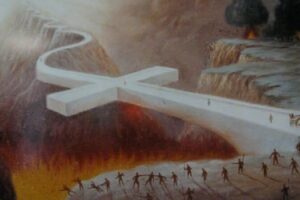What is legalism and is it a bad thing? Let’s turn to the Scriptures for more insight:
Matthew 23:23-28 (ESV)
“Woe to you, scribes and Pharisees, hypocrites! For you tithe mint and dill and cumin, and have neglected the weightier matters of the law: justice and mercy and faithfulness. These you ought to have done, without neglecting the others. You blind guides, straining out a gnat and swallowing a camel! “Woe to you, scribes and Pharisees, hypocrites! For you clean the outside of the cup and the plate, but inside they are full of greed and self-indulgence. You blind Pharisee! First clean the inside of the cup and the plate, that the outside also may be clean. “Woe to you, scribes and Pharisees, hypocrites! For you are like whitewashed tombs, which outwardly appear beautiful, but within are full of dead people’s bones and all uncleanness. So you also outwardly appear righteous to others, but within you are full of hypocrisy and lawlessness.”
Have you ever encountered any Christian “laws” that seem absurd? Even today, there are customs among denominations that evoke tremendous pressure on the believer to conform or else be excluded from worship and shunned by the regular church body.
Jesus encountered—and withstood—similar issues of legalism during His ministry. The keeping of the Sabbath was the ultimate mark of a faithful Jew. Rituals of family worship and the prohibition against any work controlled the day. Even when captives were in a foreign land, it was the Sabbath rituals that kept them from losing their identity as a people.
For Jesus, He viewed the intention for the Sabbath much differently than the Jewish leaders of His day. Three of the Gospels (c.f. Matthew 12:1-8; Mark 2:23-28; Luke 6:1-5) record the incident of the grainfields. The disciples were hungry, so as they walked through the field, they stripped grain off the standing stems and ate it. The Pharisees were right there to condemn the action. Using David as an example, Jesus reminded them of how David, hungry and weary from battle, entered the House of God and ate the consecrated bread.
In doing so, Jesus stated both a principle of the Sabbath and of any legalistic rule: The Sabbath was made for man, not man for the Sabbath, and that He is Lord over the Sabbath (Mark 2: 27-28).
Through the centuries people have built up traditions, rules, and laws to govern Christian activities because the grace of God affords too much freedom. It is in this legalism that the purity of the Gospel is most dramatically attacked. Instead of faith, there are rules. Traditions instead of spiritual thinking.
Look around you at churches where the rites of membership blind people to the truth of grace. When you examine most cults today, they are born from small excursions from the truth that developed into full-blown rules and rites of fellowship. Unfortunately, this legalism is a deterrent to sharing the Gospel the way it was meant to be and a prime culprit in the declining numbers in America’s churches today.
Jesus is Lord of the Sabbath and of all those rules that we allow to be placed upon us. When we live under His lordship, we freely choose to do or not do many things. We strive to avoid sin and worldliness, leaving us free to welcome those seeking refuge from the same; we seek holiness and a desire to bring others along; we long to emulate Christ instead of the Law; for the law never brought or will bring salvation to anyone (Romans 8:3-4; Galatians 6:15). Certainly there are rules for conduct as outlined in Scripture, but where the Bible is silent, so should we be.
When Christ truly becomes Lord of our life instead of the legalism imposed by man, we see our fellow child of God as someone worth saving, instead of abandoning them through the judging lens of legalism. For more on this study, click here.






